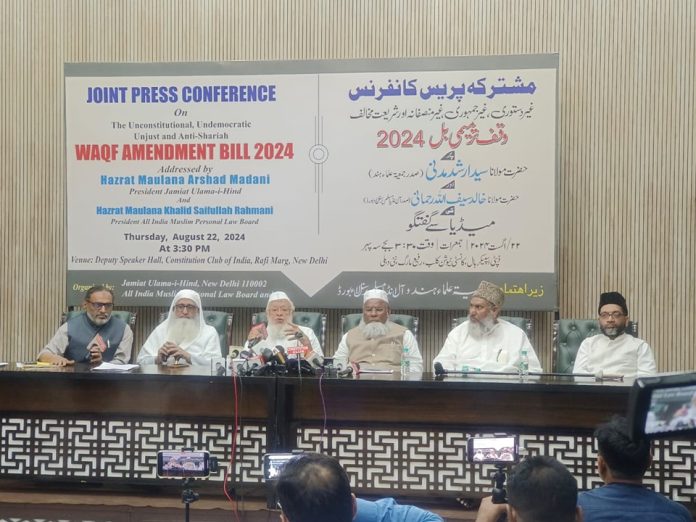New Delhi, Aug 23: The All India Muslim Personal Law Board (AIMPLB) has called upon secular political parties within the BJP-led NDA government and all opposition parties to oppose the Waqf Amendment Bill 2024 in Parliament. The Board has labelled the proposed bill as a “heinous conspiracy” aimed at seizing and dismantling waqf properties under the guise of protection. AIMPLB has urged the government to withdraw the bill immediately, warning of a potential nationwide protest if the legislation proceeds.
At a press conference held at the Constitution Club of India here Thursday, senior leaders from various Muslim organizations voiced their concerns about the bill. They asserted that the bill threatens the integrity of waqf properties, which hold significant religious and cultural importance for the Muslim community.
AIMPLB President Maulana Khalid Saifullah Rahmani, along with other prominent figures such as Jamaat-e-Islami Hind President Syed Sadatullah Husaini and Jamiat Ulama-i-Hind (Arshad faction) President Maulana Syed Arshad Madani, addressed the media. Maulana Fazlur Rahim Mujaddidi, Maulana Asghar Imam Salafi, and Dr. Syed Qasim Rasool Ilyas also participated in the deliberations. They revealed that a delegation from AIMPLB had recently met with NDA allies, including JD(U) leader Nitish Kumar and TDP leader Chandrababu Naidu, urging them to leverage their influence within the government to ensure the bill’s withdrawal. According to Rahmani, leaders from opposition parties like Tejaswi Yadav of RJD, Tamil Nadu Chief Minister M.K. Stalin, and Uddhav Thackeray of Shiv Sena (UT) have also assured their support in opposing the bill.
The AIMPLB has vowed to use all legal and democratic means to resist the bill, including collaborating with other minority groups and likeminded individuals to pressure the government. Rahmani indicated that the Board might launch a nationwide democratic movement within the framework of the Constitution if the bill is not withdrawn.
The Waqf Amendment Bill 2024 has drawn sharp criticism for its provisions, which Muslim leaders argue are designed to weaken the management of waqf properties. A key point of contention is the proposed inclusion of non-Muslims in the Central Waqf Council and Waqf Boards, a move that AIMPLB and other Muslim leaders see as a direct affront to the religious nature of waqf properties. They highlighted that only members of the respective communities are permitted to manage Hindu mutts and Sikh gurdwaras, questioning why a different standard is being applied to waqf boards.
Another major concern is the bill’s proposal to grant district collectors the authority to decide the status of waqf properties and settle disputes, effectively sidelining the Waqf-appointed Survey Commissioner and Waqf Tribunal. This, the leaders warn, could lead to the illegal takeover of waqf properties by the state in cases of disputes.
The AIMPLB also condemned the bill’s attempt to abolish the concept of “Waqf by user,” a principle in Islamic law recognized by the Waqf Act of 1995. They argued that this change could open the door for communal elements to challenge the status of long-standing waqf properties, such as mosques and madrasas, that may not be officially recorded as waqf assets. The leaders fear that the bill, if passed, could result in widespread litigation and the unlawful appropriation of Muslim properties.
In addition, the bill has been criticized for imposing restrictions on who can create waqf properties, including a condition that only a person practicing Islam for at least five years can dedicate their property as waqf. The bill also prohibits non-Muslims from dedicating property as waqf, while paradoxically mandating the inclusion of non-Muslims in waqf managing bodies.
The Waqf Amendment Bill 2024 is currently under consideration by a Joint Parliamentary Committee. The AIMPLB and other Muslim organizations continue to rally opposition against the bill, emphasizing the importance of preserving the sanctity and autonomy of waqf properties in India.




